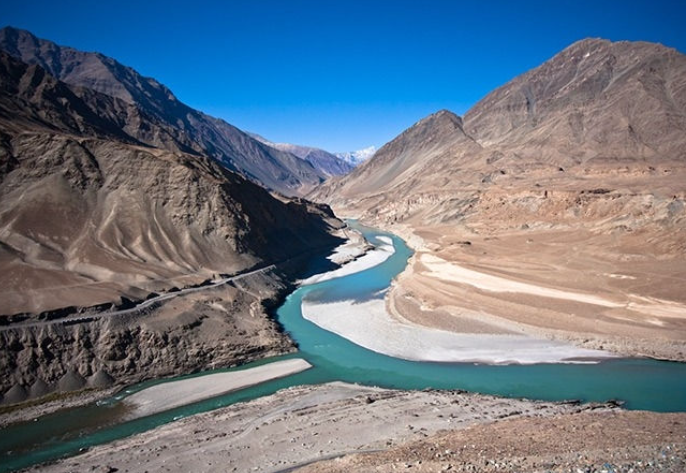India Seeks Review & Modification of the Indus Waters Treaty (IWT) (GS Paper 2, Polity)

Why in News?
- India's recent formal notice to Pakistan regarding the "review and modification" of the Indus Waters Treaty (IWT) has drawn significant attention.
- This request follows a similar initiative from January 2023 and indicates India's intention to reassess the treaty's terms after 64 years of operation.
- The inclusion of "review" in the notice suggests a more profound reconsideration of the treaty's provisions and implications.
Indus Waters Treaty (IWT) Overview
Background
- Brokered by the World Bank: The Indus Waters Treaty was signed in 1960 and aimed to resolve water-sharing disputes between India and Pakistan following the partition of British India.
- Water Allocation: The treaty allocates the waters of the six rivers of the Indus River system: India retains rights over the eastern rivers (Ravi, Sutlej, and Beas), while Pakistan has rights over the western rivers (Sindh, Jhelum, and Chenab).
- Percentage Distribution: Approximately 80% of the total water resources are allocated to Pakistan, while India retains about 19.48%.
Rights & Obligations
- India's Obligations: India is required to let the waters of the western rivers flow to Pakistan, with limited consumptive use allowed.
- Construction of Storage Facilities: India can construct storage facilities on the western rivers up to 3.6 million acre-feet, a capacity it has not fully utilized.
- Run-of-the-River Projects: The treaty permits run-of-the-river projects, subject to specific design and operational criteria, provided India notifies Pakistan of new projects.
Article XII (3) Implications
- Modification Clause: Article XII (3) of the treaty allows for modifications through a ratified agreement, thus providing a formal framework for India to propose changes.
- Significance: This formal notice marks a potential shift in India’s approach to water diplomacy with Pakistan and may pave the way for significant negotiations concerning water rights and distribution.
Reasons for India's Demand
India's rationale for seeking a review of the IWT includes several critical factors:
Fundamental Changes in Circumstances
- Demographic Shifts: Changes in population dynamics in both countries necessitate a reassessment of water needs and allocations.
- Environmental Issues: Climate change and its impacts on water resources are increasingly pressing. India cites the need to address these evolving environmental challenges as a reason for modification.
- Clean Energy Development: India is focused on meeting its emission targets and expanding renewable energy sources, which requires a reassessment of water usage for hydropower generation.
Security Concerns
- Cross-Border Terrorism: India highlights the impact of ongoing terrorism and security threats emanating from Pakistan as a significant concern. The government argues that these security issues must be factored into water-sharing agreements.
Hydropower Projects Controversy
- Kishanganga and Ratle Projects: The ongoing debate over Indian hydropower projects has led to allegations from Pakistan that these projects violate the IWT.
- Nature of Projects: These projects are classified as "run-of-the-river," meaning they generate electricity without obstructing the overall flow of the rivers, but Pakistan contends they still have detrimental effects on its water rights.
Dispute Resolution Mechanism
The IWT includes a structured dispute resolution process to address disagreements over its implementation:
First Level: Permanent Indus Commission (PIC)
- Role of PIC: The PIC is tasked with implementing and managing the treaty’s provisions. If either party plans projects on the Indus River, they must notify the other party with all required information.
Second Level: Neutral Expert
- Appointment: If the PIC cannot resolve the disagreement, a Neutral Expert appointed by the World Bank can intervene to provide a resolution.
Third Level: Court of Arbitration (CoA)
- Final Recourse: Should disputes persist, the matter escalates to a Court of Arbitration, with its chair appointed by the World Bank.
Context of the Current Notice
India’s current notice is a response to:
- Pakistan’s Objections: Pakistan’s earlier objections regarding the Kishanganga and Ratle projects led to calls for a Neutral Expert. However, Pakistan later proposed taking the matter to the Permanent Court of Arbitration, which India deemed a breach of the sequential dispute resolution mechanism outlined in the treaty.
- World Bank Involvement: The World Bank intervened in 2016, urging both countries to resolve their differences amicably, but progress stalled between 2017 and 2022. In 2022, the World Bank opted to proceed with both the Neutral Expert and PCA processes, prompting India's formal notice in January 2023, which was unprecedented in over six decades.
Conclusion
- India's move to seek a review and modification of the Indus Waters Treaty signifies a critical juncture in India-Pakistan water relations.
- As geopolitical dynamics shift, addressing water sharing amid security concerns and environmental challenges is vital.
- The outcome of these negotiations will have significant implications for bilateral relations, regional stability, and the sustainability of water resources in the context of climate change and population growth.
- Balancing national interests with cooperative water management will be essential for fostering peace and ensuring equitable resource distribution in the region.


